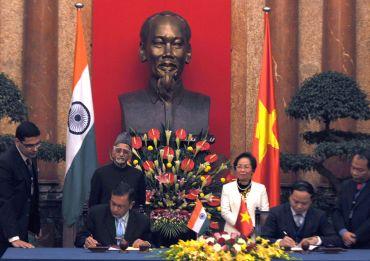 | « Back to article | Print this article |
 The closing ceremony of the India-Vietnam friendship year in 2012 in Hanoi on Tuesday saw local youth present four dances, two of them from Bollywood. One, Jai Ho!, is really an international song, but the other song, O Yaara Dil Lagana, sung and performed to by the young Thanh Loan, was an eye-opener.
The closing ceremony of the India-Vietnam friendship year in 2012 in Hanoi on Tuesday saw local youth present four dances, two of them from Bollywood. One, Jai Ho!, is really an international song, but the other song, O Yaara Dil Lagana, sung and performed to by the young Thanh Loan, was an eye-opener.
Not many remember the 1996 Manisha Koirala, Jackie Shroff and Nana Patekar starrer Agni Sakshi in India, or this song from the Partho Ghosh film. How would a young girl from another country even know of a song from her pre-teen days, leave alone sing it and perform to it, is a question that remains to be answered.
The truth is, there was a time when Bollywood films were popular in Vietnam and dubbed versions were screened here, but all of it ceased a few years ago "over royalty payments", says Ranjit Rae, India's ambassador to Vietnam. There has, however, been a trickle of Indian, mostly Hindi films being screened here -- Ek Tha Tiger released here, naturally, as did English-Vinglish -- but not enough to inspire performers with more contemporary tunes, if Tuesday afternoon's applause-inducing performance was any indication.
The India-Vietnam friendship year was meant to address exactly such a hiatus in ties between the two Asian nations. While the hard-nosed issues often grab the headlines, like South China Sea, defence and security, and trade, what is often ignored or downplayed is the transformative role of soft power.
Minister of State for Tourism Chiranjeevi, who visited Vietnam ahead of Vice President Hamid Ansari, in fact made a plea for Hanoi to enable Indian film shootings in the country with tax sops. When that happens, Indians could see some amazing locales from a nation that is remembered back home today more for its war ravages of long ago.
Vice President Ansari, in his speech at the closing ceremony, hoped that the opening of the Indian Culture Centre in Hanoi this year will expose the people of Vietnam to "the flavour of India".
Thanks to the Buddha circuit and the increasingly peripatetic Indian, there has been steady growing two-way tourist traffic between the two countries, and Indian officials are hopeful that the numbers will pick up once direct flights begin. Jet Airways had signed an agreement for this in 2011 which has been caught in the nuts and bolts of implementation but which should be sorted out this year, says Rae.
Ansari, who terms Vietnam as the "pillar of India's Look East policy," spent an hour with his counterpart, Nguyen Thi Doan, at the presidential palace on Tuesday morning discussing bilateral issues, an interaction the ministry of external affairs described as being marked by "warmth and cordiality". South China Sea came up during the mainly bilateral talks, but only to the extent of India stressing the need for peace and stability in the region, Sanjay Singh, secretary (east), said.
The bottom-line, however, remains economics, with two nations caught in a quagmire of economic slump seeking each other out. Doan's speech at the 'meeting to celebrate the success of Vietnam-India Friendship Year 2012' -- blandly called the closing ceremony in the release put out by the MEA of Ansari's speech -- presents a wish-list of what Hanoi would like from India, "one of the world's largest economies with expected GDP of $1800 billion in 2012": investments in infrastructure development, seaport construction, steel production, power generation and electronics, oil exploration and construction of India's science and technology park and a satellite data processing centre. The two sides during the day also signed a memorandum of understanding that will, among other things, identify thrust areas and opportunities for micro, small and medium enterprises in Vietnam.
Ansari, in his speech, was less expansive, stating merely that India was "confident of achieving the targeted $7 billion in bilateral trade by 2015".
Pointing to the members of parliament from different parties accompanying Ansari to Vietnam, Singh said the vice president's visit was to reinforce the momentum in the ties between the two countries, and there was support across political lines for this approach.
Ansari, during the course of a hectic day which began with him placing a wreath at the mausoleum of Ho Chi Minh, also called on President Truong Tan Sang, Prime Minister Nguyen Tan Dung and finally on Nguyen Phu Trong, secretary general of the ruling Communist Party of Vietnam. The day ended with an official dinner hosted by his counterpart, Ms Doan, with Ho Chi Minh City on his itinerary for the next two days.
To maintain the pace in ties between the two nations, Rae pointed out, regular exchange of visits by the younger leadership was essential. So one can expect the airlines to remain busy in the coming months, especially once direct flights become a reality.
Image: Vice President Hamid Ansari and his Vietnamese counterpart Nguyen Thi Doan witnessing the signing of agreements between two countries, in Hanoi on Tuesday.
Photograph Courtesy: PIB